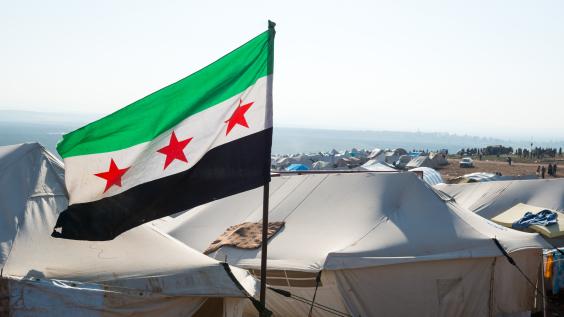Paris Attacks and Syrian Refugee Resettlement Policy

Table of Contents
Author(s)
Share this Publication
- Download PDF
- Print This Publication
- Cite This Publication Copy Citation
Yildirim, A.Kadir 2015. Paris Attacks and Syrian Refugee Resettlement Policy. Issue brief no. 11.23.15. Rice University’s Baker Institute for Public Policy, Houston, Texas.
The recent tragedy in Paris on November 13, 2015 that left 129 people dead and hundreds more injured instigated a series of heated public debates on issues such as ISIS’ ideology, how to counteract the strategic threat posed by ISIS, and the ultimate goals of the organization.
One area of great public policy concern is refugee resettlement, particularly of Syrian refugees. We have observed an uptick in public opinion against refugee resettlement. Before the Paris attacks, about 55 percent of the respondents in a CNN/ORC poll1 were favorable to the idea of bringing Syrian refugees into the United States; after the attacks, a Reuters/ IPSOS poll2 found that 41 percent of the respondents believed that countries taking in Syrian refugees should halt resettlement because of terror threats. In the same poll, 52 percent of the respondents said nations that accept refugees are less safe. In the immediate aftermath of the Paris attacks, many assumed, almost automatically, that Syrian refugees and/or ISIS recruits posing as Syrian refugees were behind the attacks; Hungarian Prime Minister Viktor Orbán suggested that terrorists “mingled” among refugees.3 Moreover, rumors about Syrian passports being recovered from the sites of the attacks abound.
This is a rather surprising turn of events within a very short period of time. Only a few months ago, the image of the small body of 3-year-old Aylan Kurdi washing ashore on the Aegean coast had the seeming effect of shifting the public mood in favor of greater acceptance of Syrian refugees. In Europe, policymakers also now oppose accepting Syrian refugees. Poland, for example, immediately suspended its participation in the EU refugee resettlement plan following the Paris attacks.4 Many other politicians have called for similar measures. By contrast, in a truly unexpected move, French President François Hollande has announced that France will accept 30,000 Syrian refugees over the course of the next two years, renewing its commitment made in September.5
Since November 13, most governors in the United States have come out against refugee resettlement in their states and expressed their intentions to take action against it.6 Similarly, and ironically, Senator Ted Cruz emerged as a leading national voice in anti-refugee sentiment; Cruz declared his intention to introduce legislation to ban “Muslim” refugees from Syria.7 These are all politically expedient moves; they aim to ride the high waves of citizen anxiety and uncertainty about events unfolding in Syria. At its core, however, these anti-refugee actions are devoid of substantive policy content.
The refugee settlement issue is a complex one, involving security, normative, and strategic dimensions. From a security perspective, critics are correct in their assessment that there is a theoretical possibility that ISIS and other terrorist groups might use the refugee resettlement process as a conduit for terror attacks in the host countries. This concern certainly necessitates taking the requisite security measures for the safety of all residents of the host country and a screening system. Nonetheless, measures such as “monitoring every Muslim in our territory,” as suggested by Slovakian Prime Minister Robert Fico, defeat the purpose of the resettlement policy and clearly impair its effectiveness.8
As far as the Paris attacks are concerned, there has been some premature speculation about Syrian passports being found at the site of attacks, implying ill-intention on the part of refugees and that ISIS effectively uses the refugee crisis to its advantage. So far, no evidence has been found to support these speculations; authorities recovered one Syrian passport, which was later found to be fake. Moreover, all of the identified terrorists thus far are “citizens of European Union countries,” further undermining the idea that refugees offer recruiting opportunities for ISIS.9
Normatively, the refugee issue poses daunting challenges. On one hand, there is little disagreement on the idea that Syrian refugees are in dire need of safe haven; the civil war and violence that has been raging the country for several years poses serious risks to the very lives of an overwhelming majority of Syrians. There is an undeniable humanitarian crisis in Syria. On the other hand, despite knowing that many are running away from violence and oppression perpetrated by ISIS, accusations that the refugees assist ISIS in their plans or facilitate its actions and therefore should be turned down on the grounds of their religion betray the core values of freedom and equality.
Further, rejecting refugees in the face of pernicious violence, partly motivated by religious fervor, is simply at odds with universal human rights; this is particularly the case for the United States, a country that takes pride in the fact that it is built by immigrants who fled from religious persecution. Unfortunately, this is not the first time the United States has been faced with a refugee crisis. The country was in a similar situation in the 1930s. When European Jews sought refuge from Nazi violence, the American response was eerily similar to the one shown to Syrians: “Refugees from Nazism are now widely and popularly perceived as ‘genuine,’ but at the time German, Austrian and Czechoslovakian Jews were treated with ambivalence and outright hostility as well as sympathy.”10
Most importantly, the recent shift against refugee resettlement is fundamentally counterproductive to U.S. interests. Although politically convenient on the eve of critical elections, manipulation of the refugee resettlement issue is likely to undermine U.S. domestic and foreign policy. Specifically, it unnecessarily stigmatizes refugees and, more broadly, immigrant communities. Refugees who are already dealing with serious trauma, distress, and adaptation to a new environment also face societal, political, and economic marginalization and disenfranchisement.
Research shows that despite many challenges faced by refugees and immigrants, crime rates remain low compared to native populations in the United States and beyond.11,12,13 According to a study in Germany, the recent influx of Syrian refugees in Germany did not lead to an increase in crime rates. Moreover, countries that fail to address refugee and immigration issues effectively and instead create conditions for discrimination and failed cases of integration are also the ones facing higher levels of social disturbance in the form of “antiauthority violence,” implying a strong association between the two.14,15,16
Strategically, anti-refugee policies are likely to aggravate social and political polarization on this front. In the short term, anti-refugee policies and polarization result in two interrelated outcomes. Ideologically, it reinforces the narrative by ISIS and likeminded radical groups in how the West is perpetually “hostile” to Islam and Muslims, rejecting them in the direst of conditions. It helps ISIS and similar groups invoke religious and civilizational conflict. Politically, the halting of Syrian refugees and the concomitant anti-Western propaganda offers a fertile recruiting tool for radical groups. In the words of U.S. Representative Luis Gutiérrez, “ISIS could not have written a better script.”17 ISIS, by contrast, views refugees and the idea of seeking refuge in countries beyond its borders as actions that undercut its ideology and legitimacy.
The Syrian refugee resettlement issue carries implications beyond its moral and normative dimensions. Both the short- and long-term strategic significance of the issue requires immediate action; failure to do so will result in losing an edge in effectively addressing ISIS terror in Syria and beyond and failing to introduce a measure of stability to a region of the world that contains vital U.S. interests.
Endnotes
1. “CNN/ORC Poll: Partisan Split over U.S. Taking Refugees,” CNN, September 14, 2015: http://www.cnn.com/2015/09/14/politics/cnn-poll-migrant-crisis.
2. “Exclusive: After Paris, Americans Want U.S. to do more to Attack Islamic State – Poll,” Reuters, November 16, 2015: http://www.reuters.com/article/2015/11/16/us-france-shooting-usa-poll-idUSKCN0T528Y20151116#MP2Pq7P33IzbPxYZ.97.
3. “Jihadists ‘Mingled’ Among Migrants, Hungary PM Says After Paris Attacks,” France 24, November 16, 2015: http://www.france24.com/en/20151116-jihadists-mingled-among-migrants-hungary-pm-says-after-paris-attacks.
4. “After Paris Attacks, Poland Says It Will No Longer Participate in EU’s Refugee Plan,” Slate, November 14, 2015: http://www.slate.com/blogs/the_slatest/2015/11/14/poland_says_it_will_resist_eu_refugee_ plan_after_paris_attacks.html.
5. “Paris Attacks: President Francois Hollande Welcomes 30,000 Refugees in the Next Two Years,” Independent, November 18, 2015: http://www.independent.co.uk/news/world/europe/paris-attacks-president-francois-hollande-welcomes-30000-refugees-in-next-two-years-a6739221.html.
6.“Ryan to Ask House to ‘Pause’ US Refugee Program,” CNBC, November 17, 2015: http://www.cnbc.com/2015/11/16/us-states-to-turn-away-syrian-refugees.html.
7. “Cruz to Offer Bill Banning Syrian Refugees,” The Hill, November 16, 2015: http://thehill.com/policy/nationalsecurity/260317-cruz-to-offer-billbanning-syrian-refugees.
8. “‘We are Monitoring Every Muslim’ After Paris Attacks, Claims Slovakian PM,” Independent, November 17, 2015: http://www.independent.co.uk/news/world/europe/we-are-monitoring-every-muslim-after-paris-attacks-claims-slovakian-pm-a6737851.html.
9. “Were Syrian Refugees Involved in the Paris Attacks? What We Know and Don’t Know,” Washington Post, November 17, 2015: https://www.washingtonpost.com/news/worldviews/wp/2015/11/17/were-syrian-refugees-involved-in-the-paris-attacks-what-we-know-and-dont-know/?postshare=4891447794791531&tid=ss_tw.
10. Tony Kushner and Katharine Know, Refugees in an Age of Genocide: Global, National, and Local Perspectives During the Twentieth Century (New York: Routledge, 1999), p. 408.
11. Walter Ewing, Daniel Martinez, and Ruben Rumbaut, “The Criminalization of Immigration in the United States,” American Immigration Council, 2015: http://www.immigrationpolicy.org/justfacts/anecdotes-evidence-setting-record-straight-immigrants-and-crime-0.
12. Ruben Rumbaut and Walter Ewing, “The Myth of Immigrant Criminality and the Paradox Assimilation,” American Immigration Council, 2007, http://www.immigrationpolicy.org/special-reports/myth-immigrant-criminality-and-paradox-assimilation.
13. Patricia L. Easteal, “Vietnamese Refugees in Australia: Crime Rates of Minors and Youths in New South Wales,” Australian Institute of Criminology, 1989. Available at SSRN: http://ssrn.com/abstract=1558150
14. Rafaela Dancygier and David Laitin, “Immigration into Europe: Economic Discrimination, Violence, and Public Policy,” Annual Review of Political Science 17(2014): 43-64.
15. Sofie Fedlund-Blomst, “Assessing Immigrant Integration in Sweden After the May 2013 Riots,” Migration Policy Institute, January 16, 2014: http://www.migrationpolicy.org/article/assessing-immigrant-integration-sweden-after-may-2013-riots.
16. “Immigration: France Sees Tensions Rise Five Years on from Paris Riots,” Guardian, November 16, 2010, http://www.theguardian.com/world/2010/nov/16/france-racism-immigration-sarkozy.
17. “Dem: Denying Syrian Refugees the ‘Reaction ISIS Wanted,’” The Hill, November 17, 2015: http://thehill.com/blogs/floor-action/house/260412-dem-denying-syrian-refugees-the-reaction-isis-wanted.
This material may be quoted or reproduced without prior permission, provided appropriate credit is given to the author and Rice University’s Baker Institute for Public Policy. The views expressed herein are those of the individual author(s), and do not necessarily represent the views of Rice University’s Baker Institute for Public Policy.



